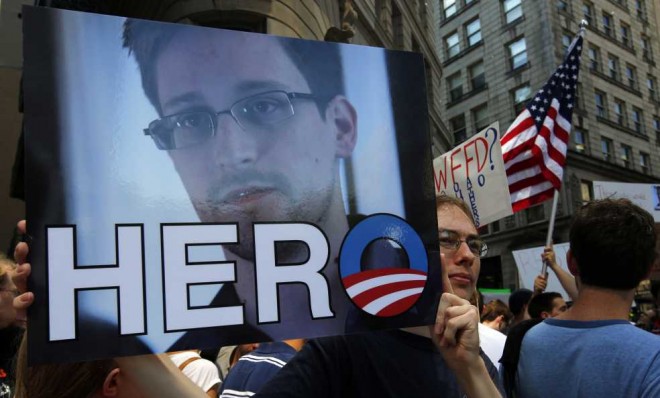What America thinks of Edward Snowden
He's more whistle-blower than traitor, according to a new poll. Is there an option C?


A free daily email with the biggest news stories of the day – and the best features from TheWeek.com
You are now subscribed
Your newsletter sign-up was successful
As Edward Snowden presumably prepares for life in Venezuela or some other South American country, a new Quinnipiac University poll has some welcome news for the fugitive NSA leaker.
In the survey, released Wednesday, 55 percent of respondents said Snowden is "more of a whistle-blower" than a traitor, while only 34 percent viewed him as "more of a traitor." The public's "verdict that Snowden is not a traitor goes against almost the unified view of the nation's political establishment," says Quinnipiac's Peter Brown. And surprisingly, it transcends party, gender, income, education, age, and income group.
What's more, Quinnipiac recorded a pretty dramatic shift in Americans' views on the trade-off between security and privacy, in a way Snowden would appreciate: 45 percent say government anti-terrorism policies "have gone too far in restricting the average person's civil liberties," while 40 percent say the policies "have not gone far enough to adequately protect the country." When Quinnipiac asked the same question in 2010, respondents said government policies didn't go far enough, by a 63 percent to 25 percent margin.
The Week
Escape your echo chamber. Get the facts behind the news, plus analysis from multiple perspectives.

Sign up for The Week's Free Newsletters
From our morning news briefing to a weekly Good News Newsletter, get the best of The Week delivered directly to your inbox.
From our morning news briefing to a weekly Good News Newsletter, get the best of The Week delivered directly to your inbox.
Snowden may or may not care about this poll, but The Guardian's Glenn Greenwald, who published many of Snowden's leaks, is clearly happy about it. The survey shows that "Americans, by a large margin, have positive views of Snowden's actions despite all the demonization" from the "the U.S. government, its establishment press, and both political parties," he says. The American people "seem to have reached a much different conclusion than the one prepared for and fed to them."
Maybe, says Nate Silver at The New York Times. The Quinnipiac questions about civil liberties and anti-terrorism give us meaningful data, but "I'm not sure that the one about Mr. Snowden tells us very much." For example, the survey describes Snowden as "the national security consultant who released information to the media about the phone scanning program."
However, Mr. Snowden has also released information to the news media about other N.S.A. activities, such as those it has conducted in China. Some Americans may be pleased by Mr. Snowden's disclosures about how the N.S.A. conducted surveillance against U.S. citizens — but displeased that he has also disclosed details about its international surveillance. The Quinnipiac poll should probably have described a fuller spectrum of the information that Mr. Snowden has released. [New York Times]
The other big problem with the poll, says Katy Steinmetz at TIME, is that it didn't "provide a third option for the middle ground, like 'leaker' or 'sorry, Quinnipiac, neither of those quite fits.'" There's a wide gulf between "traitor" and "whistle-blower," and most public opinion probably fits inside it.
Other recent surveys have shown more ambiguity over Snowden. A June 17-18 Rasmussen poll found that 21 percent of respondents saw Snowden as a traitor, 12 percent said he is a "heroic whistle-blower," 29 percent said it's too early to tell, while the biggest number — 34 percent — said Snowden falls "somewhere in between" hero and villain. A June 11-13 CNN/ORC International poll found that 52 percent of Americans disapproved of Snowden's actions, versus 44 percent who approved.
A free daily email with the biggest news stories of the day – and the best features from TheWeek.com
We seem equally conflicted about the NSA programs revealed by Snowden. In the same Quinnipiac poll that found a plurality of Americans believe that anti-terrorism policies go to far, a 51 percent majority supported a program in which "all phone calls are scanned to see if any calls are going to a phone number linked to terrorism," 53 percent said it is "necessary to keep Americans safe," and 53 percent said the program is "too much intrusion into Americans' personal privacy."
Given what we know, "are the majority of Americans really Snowden fans?" asks J. Dana Stuster at Foreign Policy. "Maybe." But all this Quinnipiac poll purports to show us is that "Americans are more willing to call Snowden a whistle-blower than a traitor."
Peter has worked as a news and culture writer and editor at The Week since the site's launch in 2008. He covers politics, world affairs, religion and cultural currents. His journalism career began as a copy editor at a financial newswire and has included editorial positions at The New York Times Magazine, Facts on File, and Oregon State University.
-
 Bonfire of the Murdochs: an ‘utterly gripping’ book
Bonfire of the Murdochs: an ‘utterly gripping’ bookThe Week Recommends Gabriel Sherman examines Rupert Murdoch’s ‘war of succession’ over his media empire
-
 Gwen John: Strange Beauties – a ‘superb’ retrospective
Gwen John: Strange Beauties – a ‘superb’ retrospectiveThe Week Recommends ‘Daunting’ show at the National Museum Cardiff plunges viewers into the Welsh artist’s ‘spiritual, austere existence’
-
 Should the EU and UK join Trump’s board of peace?
Should the EU and UK join Trump’s board of peace?Today's Big Question After rushing to praise the initiative European leaders are now alarmed
